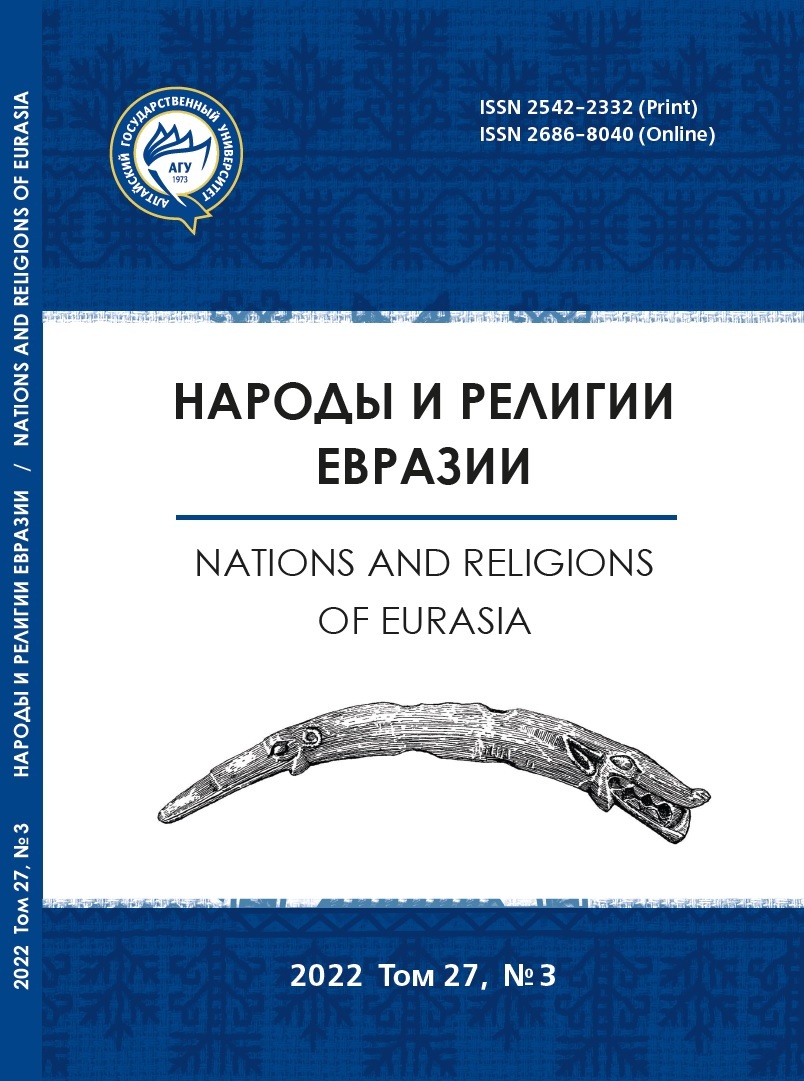Ethnic and religious aspects tolerance in the Republic of Tuva (based on the results of a sociological study)
Main Article Content
Abstract
The article presents the results of a sociological study conducted in 2019 jointly with the Department of Regional Studies of Russia, National and State-Confessional Relations of Altai State University and the Religious Studies Sector of the Tuva Institute of Humanities and Applied Socio-Economic Research under the Government of the Republic of Tuva on the territory of Tuva. In the course of the study, materials were obtained to assess the level of ethnic and religious tolerance in the region.
The sample of the study consisted of 334 people, of which 89% of respondents were Tuvinians, 5% of the respondents were Russians and 6% were from other ethnic groups. In order to strengthen civil unity on the territory of the Republic of Tyva and prevent the spread of extremism in the region, the Agency for Nationalities Affairs was established. According to respondents, it is the competent work of law enforcement agencies and special services that can stop the spread of extremism. At the same time, more than half of the respondents do not associate extremism with a religious worldview.
Special attention in the formation of tolerance is paid to the problem of interethnic marriages. It should be noted that the younger generation is open to the perception of a different cultural tradition, but the opinion of the older generation is very important in solving a number of issues. The existence of mono-ethnic families to a certain extent allows preserving ethnic identity in the context of globalization. It is the need to preserve national culture that leads to an unwillingness to build interethnic marriages. At the same time, the majority of respondents are ready for friendship with a representative of a different cultural tradition. A fairly large percentage of respondents believe that religion can negatively affect the formation of interethnic relations. In most cases, this is due to the unfriendly attitude of representatives of different faiths to each other. At the same time, the ethnic trait in this case plays the least importance. Despite the lack of information in the media about the religious situation in the region, it should be noted that the residents of Tuva have a generally tolerant attitude towards representatives of other cultures and religious traditions. A competent policy of interaction between all government structures, including local self-government bodies, as well as with national public associations and scientific centers of the republic allows ensuring stability in the region. Peace and stability in the region is also explained to a certain extent by the predominance of one Buddhist denomination and one Tuvan ethnic group.
Downloads
Metrics
Article Details

This work is licensed under a Creative Commons Attribution 4.0 International License.
References
Бадмаев В. Н., Уланов М. С., Ламажаа Ч. К., Бичелдей У П., Антонов В. И., Очирова, О. А. Россия и буддийский мир глазами молодежи Тувы, Бурятии и Калмыкии (по материалам социологического опроса) // Новые исследования Тувы. 2020. № 1. С. 35-49.
Всероссийская перепись населения (2010). URL: https://www.gks.ru/free_doc/new_site/ perepis2010/croc/perepis_itogi1612. htm (дата обращения: 16.10.2021).
Гончарова Г. С., Савельев Л. Я. Семейно-брачные отношения у народов Сибири: проблемы, тенденции, перспективы. Новосибирск : Нонпарель, 2004. 288 с.
Государственная программа «Укрепление гражданского единства и национально-культурное развитие народов Республики Тыва на 2014-2016 годы» // Официальный сайт Правительства Республики Тыва. URL: https://rtyva.ru/content/1411/ (дата обращения: 16.10.2021).
Дашковский П. К., Шершнева Е. А., Бичилдей У П., Монгуш А. В. Религиозная ситуация в Республике Тыва (по результатам социологического исследования) // Новые исследования Тувы. 2021. № 2. С. 18-34.
Информация о межэтнических отношениях в Республике Тыва // Официальный сайт Агентства по делам национальностей Республики Тыва. URL: https:// xn-7sbabj7aaqgsml6be4ce. xn-plai/mezhetnicheskie-otnosheniya/ (дата обращения: 16.10.2021).
Ламажаа Ч. К. Тува как лимитрофная зона: язык, религия и идентификация тувинцев // Новые исследования Тувы. 2021. № 3. С. 178-194.
Отчет о работе Агентства по делам национальностей Республики Тыва в 2019 году // Официальный сайт Агентства по делам национальностей. URL: http:// xn-7sbabj7aaqgsml6be4c8e. xn-p1ai/dokumenty/ (дата обращения: 16.10.2021).
Постановление Правительства Республики Тыва от 23 апреля 2020 г. № 174 «Об утверждении государственной программы Республики Тыва „Реализация государственной национальной политики Российской Федерации в Республике Тыва на 2021-2023 годы"» // Официальный сайт Правительства Республики Тыва. URL: http:// www.npa.rtyva.ru/page/3901. html (дата обращения: 16.10.2021).
Постановление Правительства Республики Тыва от 15 февраля 2017 г. № 40 «О внесении изменений в государственную программу Республики Тыва „Укрепление гражданского единства и национально-культурное развитие народов Республики Тыва на 2017-2019 годы"» // Официальный интернет-портал правовой информации. URL: http://publication.pravo.gov.ru/SignatoryAuthority/region17 (дата обращения: 16.10.2021).
Постановление Правительства Республики Тыва от 17 ноября 2017 г. № 509 «О внесении изменений в государственную программу Республики Тыва „Укрепление гражданского единства и национально-культурное развитие народов Республики Тыва на 2017-2019 годы"» // Официальный интернет-портал правовой информации. URL: http://publication.pravo.gov.ru/SignatoryAuthority/region17 (дата обращения: 16.10.2021).
Постановление Правительства Республики Тыва от 26.01.2018 № 22 «Об утверждении государственной программы Республики Тыва „Реализация государственной национальной политики Российской Федерации в Республике Тыва на 2018-2020 годы"» // Официальный сайт Правительства Республики Тыва. URL: http://www.npa.rtyva.ru/ page/2595. html (дата обращения: 16.10.2021).
Постановление Правительства Республики Тыва от 29 ноября 2016 г. № 515 «Об утверждении государственной программы Республики Тыва „Укрепление гражданского единства и национально-культурное развитие народов в Республике Тыва на 2017-2019 годы"» // Официальный интернет-портал правовой информации. URL: http://publication.pravo.gov.ru/SignatoryAuthority/region17 (дата обращения: 16.10.2021).
Постановление Правительства Республики Тыва от 29.12.2016 № 552 «Об утверждении Положения об Агентстве по делам национальностей Республики Тыва и его структуры» // Официальный интернет-портал правовой информации. URL: http://publication. pravo.gov.ru/Document/View/1700201612290005? index=1&rangeSize=1 (дата обращения: 16.10.2021).
Постановление Правительства Республики Тыва от 8 октября 2013 г. № 584 «Об утверждении государственной программы Республики Тыва „Укрепление гражданского единства и национально-культурное развитие народов в Республике Тыва на 2014-2016 годы"» // Электронный фонд правовых и нормативно-технических документов. URL: https://docs.cntd.ru/document/430502436 (дата обращения: 16.10.2021).
Указ Президента Российской Федерации от 19.12.2012 г. № 1666 «О Стратегии государственной национальной политики Российской Федерации на период до 2025 года» // Президент России. URL: http://kremlin.ru/acts/bank/36512 (дата обращения: 16.10.2021).

